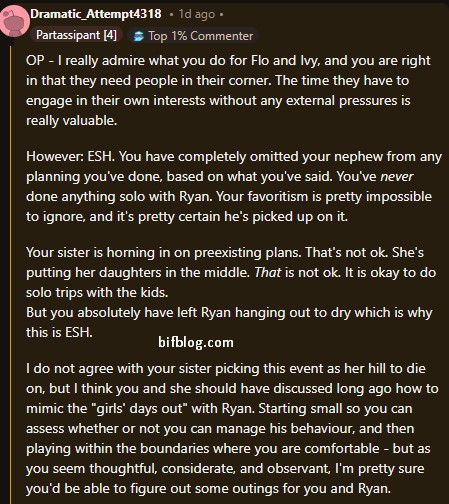I (42F) have two nieces, Flo (14F) and Ivy (11F), and a nephew, Ryan (10M), through my brother Tom (46M) and SIL Kate (45F). Flo and Ivy are their biological daughters, while Ryan was adopted two years ago after being fostered by them for three years. I also have a daughter, Ava (12F). We live close by and are generally a tight-knit family.

Ryan had a difficult life before foster care, leading to behavioral and developmental challenges. He struggles with long events like plays or shows and can have unpredictable meltdowns. Because of this, Tom and Kate are cautious about taking him to certain places, and the girls often miss out on having both parents at their events.

Whenever we take Ava to the theatre, museums, or activities Ryan wouldn’t enjoy, we bring Flo and Ivy along. Sometimes their parents pay, sometimes we cover the costs. We have never taken Ryan without his parents because his interests differ from the girls’, and I don’t feel confident managing his behavior alone. Flo and Ivy have also expressed that they appreciate time away from their brother, who often needs extra attention.

This Friday, I planned a girls’ trip to a Christmas theme park in London a pricey outing for which, I am covering the costs. On Sunday, Kate called asking if Ryan could come, saying he’d seen ads and was excited about the trip. She even offered to pay his way.
I told Kate no because I wasn’t sure how Ryan would handle such a crowded place, and this was meant to be a special girls’ trip. Kate insisted that Ryan had been to similar events before and that his sisters could help if needed. I explained that putting responsibility on the girls wasn’t fair and that I didn’t want to prettify them. I also suggested Tom take Ryan another day when he’s off work, but Kate got upset. She accused me of being ablest and biased against Ryan because he’s adopted.

Things escalated, and Kate told Flo and Ivy they couldn’t go unless Ryan came too. Flo texted me, begging not to let Ryan come, while Ivy felt torn because she loves her brother but didn’t want the trip disrupted. Now, Tom, my mom, and my sister think I’m playing favorites and should include Ryan to be fair. My husband supports me, saying the girls deserve this special day.
For context, I do spend quality time with Ryan. We live 15 minutes away, and I visit often. We share a love for building Lego sets, and I always bring him a new set for his birthday and Christmas. My daughter’s interests are very different from Ryan’s she’s into arts, theater, shopping and movies, while Ryan loves martial arts, video games, and Legos.

NTA. You’re right Flo and Ivy need someone in their corner, and they’re lucky to have an aunt who takes them on outings their brother might not enjoy. Are their parents usually supportive of the girls, or do they often put Ryan’s needs first? Are the girls being parentifiy?
Their parents are generally supportive when it comes to school, hobbies, and other activities. However, Ryan is a sensitive topic. There have been times when he’s lashed out at them during meltdowns, and when the girls brought it up, their parents told them to be understanding because of Ryan’s rough past. I get that, and Ryan is a great kid most of the time, but he can be unpredictable and hard to calm down..

As for parentification, Tom and Kate are usually good about not putting responsibility on the girls. However, there have been a few concerning instances. Flo refuses to babysit Ryan alone because he’s nearly her height and probably stronger. The one time they tried, she walked him over to my house.
There was also some conflict with the girls’ old school when Kate insisted that Ivy be brought in to comfort Ryan if he was inconsolable and their parents couldn’t be there. The school refused. Now that Ivy is in secondary school, we wonder how things will go next year when Ryan transfers there.

Why is Kate using Ivy as Ryan’s support system? She needs to rethink this approach because relying on the girls for emotional support will only build resentment over time. I hope Ryan is getting professional help to develop independent coping strategies.

I agree, and I’ve expressed similar concerns. I know Tom and Kate are trying their best, but I do worry about long-term resentment. As far as I know, Ryan is in therapy, and they’re working on coping techniques. I hope that, with time, he’ll learn how to regulate his emotions better without relying so much on his sisters.

Final Thoughts:
You’re clearly in a difficult position, trying to balance compassion for Ryan while honoring your nieces’ need for individual attention and fun experiences. Your intentions seem thoughtful and well-meaning. You’ve recognized that Ryan’s needs are unique and require specialized support, which you aren’t equipped to handle alone, especially on a high-energy outing meant to be fun for the girls.
Your boundary-setting doesn’t seem rooted in exclusion or favoritism, but rather in practicality. You’re ensuring the girls get a much-needed break without the added pressure of managing their brother’s potential struggles. This is crucial, as children like Flo and Ivy, who often take a backseat to a sibling with additional needs, can feel overlooked or burned out if they don’t get time for themselves.
Tom and Kate may be projecting their frustrations about managing Ryan’s needs onto you, feeling defensive or worried that you’re rejecting him. However, the fact that you’ve built a meaningful relationship with Ryan through shared activities like building Legos shows your genuine care. You aren’t excluding him from your life you’re just tailoring your outings based on individual preferences and dynamics.
Going forward, consider explaining your perspective to Tom and Kate in a calm, empathetic conversation. Emphasize that you love all three kids but want to create special moments tailored to each child’s needs. Maybe even suggest planning a future outing focused on Ryan’s interests, helping them see that inclusion doesn’t mean every event has to involve everyone.
Overall, you’re NTA. You’re navigating a complex family dynamic with sensitivity while maintaining necessary boundaries. Your thoughtful actions demonstrate care and fairness for all three kids.

Comments are closed.